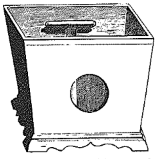Hugh Bayless: The Best Towns in America; Houghton Mifflin; Boston.
A semanticist would have a field day with the title affixed to Mr. Bayless’s efforts. The word “best” is one of the most subjective in the English language. And “town”: What, exactly, are the definitive differences between town, village, municipality, city? (Hint: It isn’t size; Chicago, the “Second City” is a “toddlin’ town,” and Skokie, officially a village, numbers well over 60,000.) The subtitle: “A Where-to-Go Guide for a Better Life.” Disregarding the subjective problems with “better” (better than what?), the question remains: Does the quality of one’s life really depend on the location in which it is lived?
What is left are merely Mr. Bayless’s preferences. He prefers a “population range of25,000 to 100,000.” He also prefers the warmer climes: of his 50 “best” towns, only six are in cold weather areas (IO if northern California and western Oregon qualify as cold). There apparently is no place worth living in all of Washington, Montana, Nevada, Utah, Colorado, Wyoming, the Dakotas, Kansas, Minnesota, Michigan, Ohio, West Virginia, Pennsylvania, and the entire northeast portion of this country.
Life is whatever you make it — wherever you are. That’s a worn-out truth, perhaps. But evidently it bears repeating — Mr. Bayless and his publisher don’t know it yet.
David Sudelson; Shakespeare’s Restorations of the Father; Rutgers University Press; New Brunswick, NJ.
In recent years, the spectacle of militant feminism has often suggested histrionics rather than high drama It looks as if Euripides’ Bacchae has been enacted anew, closer to a farce, with thousands of women behaving like Agave and her sisterhood of revelers. After forsaking the hearth for the modern heights, these devotees to the rites of self-fulfillment are often as frenzied in their wrath as the Bacchanalian women, just as likely to mistake an approaching child as something nonhuman (“Product of Conception” has replaced ‘Wild boar” as the common misnomer) and therefore just as likely to tear their offspring to bloody shreds while exclaiming, ”Victory! Victory!” Sanely conservative in his social views, Shakespeare made a better ordered, beneficently patriarchal society his dramatic standard, violated at tremendous cost in the tragedies, as David Sundelson demonstrates, but at least partially realized in the comedies and histories. cc



Leave a Reply